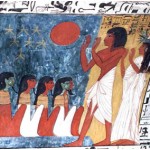Solar Eclipse Events in the New Kingdom Part 2 – Astronomical Analysis
The sun played a central role in the religion and culture of Ancient Egypt. It is therefore surprising that there seems to be no unambiguous mention of solar eclipses in Ancient Egyptian texts. Eclipses would certainly have been experienced by the Ancient Egyptians and records of them would be expected to occur in the religious corpus. [more…]
Part 1 of this paper looked at the source texts and reliefs. Part 2 now sets out the astronomical background and predicts the solar eclipse events that would have occurred during the New Kingdom. These are then correlated with the New Kingdom texts and funerary material to test the hypothesis that these might record actual eclipse events. [more…]

Solar Eclipse Events in the New Kingdom – Part 1: Texts and Funerary Material
This paper discusses a class of inscriptions appearing on eleven artefacts together with text and vignettes from five tombs and funerary material from Deir el-Medina, which may contain expressions made in response to eclipses. It is proposed that: [more…]
a) these artefacts record the witnessing of a deep solar eclipse; and [more…]
b) ill understood at the time, the eclipse was interpreted by witnesses as a form of punishment or omen and was consequently expressed in religious terms on stelae; protection against recurrences of the event was also included in tombs and on funerary furniture. [more…]
 By
By